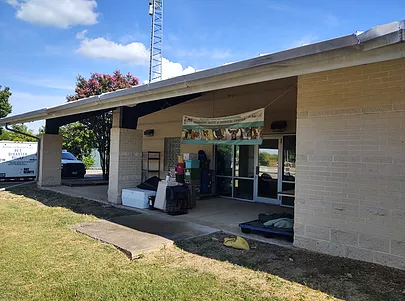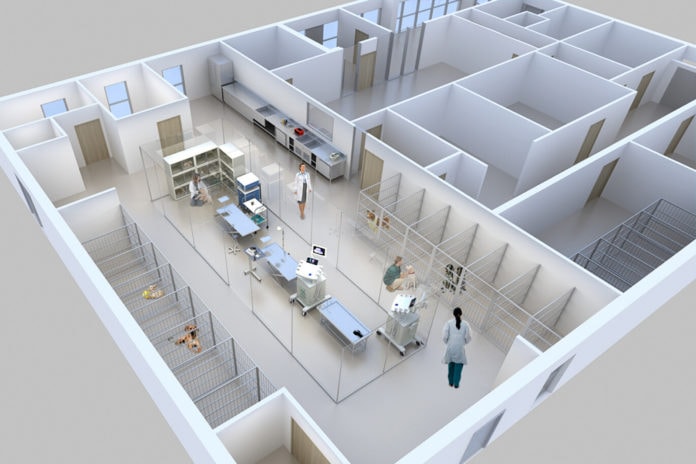Saving Animals, Expanding Care
When it comes to sheltering and saving the lives of animals, is there ever enough space?
The folks at the Tri-City Animal Shelter & Adoption Center, which serves Cedar Hill, Duncanville and DeSoto, asked themselves that question. Now, they are pleased to have expanded their facilities with the Lifesaving and Learning Center, which will have a soft grand opening Aug. 28.
“We knew many shelters had successfully been doing in-house spays/neuters for their animals. This took space, and we were saddened to think we may have to compromise our valuable animal space to make this happen,” Tri-City Animal Services Manager Tammy Miller said. “Then we remembered the empty building right next door that still belonged to the three cities. We reached out to contractors to get an idea of the feasibility of use of that building for this purpose, estimates on renovation costs, and so began the idea.
“Once we felt confident this was the right direction to move in we realized the building was a little too large for just surgery. Knowing that education is a big focus of the Friends (of Tri-City, support group for the shelter) and TCAS, and believing education is imperative to improving the future, we knew we wanted to see how this could best fit in this space.

Birth of Lifesaving & Learning Center
“We had long since been partnering with Cedar Hill ISD, Duncanville ISD, and DeSoto ISD through their various tradesman and STEM programs. It was not a long jump to realize this space could be used to expand those critical partnerships and thus the idea of a Lifesaving and Learning Center was born.”
The building is about 4,500 square feet and stands alone next door to the existing shelter. In addition to adding a classroom area with the benefit of being able to watch surgeries in real time and ask questions (through a technology grant made possible by Texadia), it also adds two very large spaces to increase treatment areas.
“Not only do these areas specifically increase the number of animals we will be able to treat, but it does so in a peaceful environment in fear free colors with a large secure exterior play yard,” Miller explained.
Providing Education Opportunities In Vet Care
This on-site surgery suite and medical center, dedicated to caring for shelter animals without transportation needs and capacity issues, will allow animals to spend less time in the shelter and free up staff to do more hands-on animal care. Isolation rooms will protect the health of the general shelter population, while shortening recovery time for sick animals, and providing more comfort during this extended stay.”
Friends of the Tri-City Animal Shelter and Adoption Center Mary White said, “As the name suggests, the new Lifesaving and Learning Center will save more lives and provide educational opportunities in veterinary care. Having ample space for medical attention means animals in the shelter can receive all healthcare onsite instead of at community veterinary clinics, reducing travel time and stress on the animals and ultimately accelerating their recovery and chances at finding loving homes.
“Onsite veterinary care will also cost the community less to treat homeless, lost, and abandoned animals, improving health outcomes with limited resources. The operating room in the new facility has an adjoining classroom that allows students in K-12 and college to watch procedures live, advancing learning objectives in the local community.”
Increasing Community Cat Program
While primarily a space for shelter animals, Miller said it will allow the shelter to increase its community cat program where any citizen of the three cities can have a feral cat spayed or neutered at no charge.
“Feral cat and foster programs will have room to expand. More children will have great exposure to humane education. All of which will help save lives,” Miller said.
“We hope to have all animals sterilized before they hit the adoption kennels. This will allow for animals to go home the same day as adoption. We work hard to make our shelter be as close to a home-like experience as possible, but it is still no substitute for the real thing. From homeless to home happy and as soon as possible is always our goal.”
Rehabbing wildlife
While the shelter primarily deals with dogs, cats, puppies, and kittens, they often have other pets such as birds, rabbits, hamsters, ferrets, or snakes come in.
“We are also very proud to have two well-known permitted wildlife rehabbers on our staff who help save thousands of injured or orphaned wild animals each year,” Miller said. “This space will allow us an area away from the seeming threat of a cat or a dog for these high stress creatures as they wait for transport to a longer-term rehab facility’s care.”
Each year TCAS services around 7,000 animals. In the past year, they found homes for over 900, almost the same amount were reunited with their owner, and more than three times this number were assisted through one of their programs, such as the high volume transport program, community cat program, HELP, and Wag on Wheels. More information on these programs can be found on their website at www.luvpets.org .
“It is important to know we need the communities’ help to further all these programs, but of greatest current need is our transport program,” Miller said. “This is a program where donations are used to get animals to Northern states where overpopulation has been under control for a much longer time, and therefore homes are in a more plentiful supply than here.”
Tri-City Animal Shelter Has A Need For Volunteers
Miller said the need for volunteers has also grown.
“Oh, my goodness and unequivocally yes! We always need volunteers, and literally could not do what we do without them,” she said. “For us they take pictures, bathe animals, build humane traps, do laundry or dishes, walk dogs, socialize and calm cats, do adoption follow-up calls, bottle feed, foster, mentor other volunteers, and the list goes on and on.
“We are now developing a volunteer job description for a recovery technician. We are looking for a few people willing to come in on surgery days whose focus would be soothing and monitoring animals in the recovery period. They will be trained to extubate as well as to monitor breathing, capillary refill times, body temperatures and other vitals used to help ensure a speedy safe surgery recovery.”
Miller added that none of this could have been done without the support of the administration and councils of the three cities, the communities Friends of Tri-City.
“Year after year we are proud that your Tri-City Animal Shelter & Adoption Center receives exemplary reports on their annual surprise inspection from the state’s health department. However, a beautiful building, a clean shelter, and quality basic care is not enough to maintain the premiere status that our shelter is known for or strives for,” she said. “To date, TCAS continues to provide this high level of care with one of the smallest tax dollars to animal served ratios in all of the Best Southwest. Our Friends of Tri-City continue all of their hard work to help bridge this gap.”
Speaking of Friends of Tri-City, Miller listed several donation opportunities, including:
- Gala sponsors are needed for the Paws, Claws, and Outlaws Gala on Nov. 6, This is the Friends’ largest annual fundraiser and helps with the majority of their lifesaving programs.
- Lilly’s Fund, which is a generous fund, created in loving memory of a TCAS alum. This fund is specifically to help with medical needs such as broken legs, eye enucleations, and other medical issues that the animals sometimes suffer from the perils of being on the street.
- Covid-19 response and Pet Retention programs, which are funds to help people keep their pets during these tough times.
- Community cat program, which assists with the costs of the trap neuter return and return to field programs to prevent the unnecessary euthanasia of feral cats and stop overpopulation.
- Dog Park fund to help create a one-of-a-kind secure off-leash dog park for pet owners and pups from all three cities to enjoy. The hope is to have this centrally located right next to the shelter, where dog owners may even pop into the shelter, fall in love, and expand their family.















